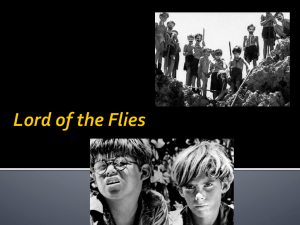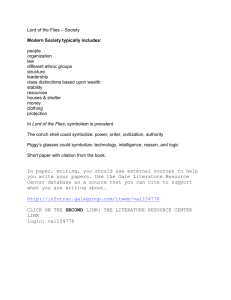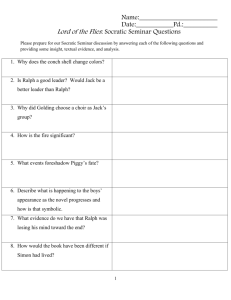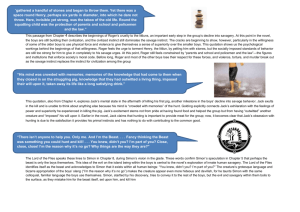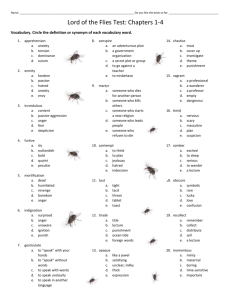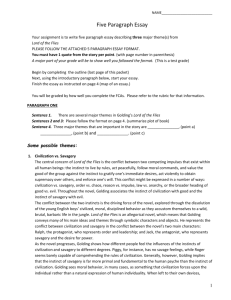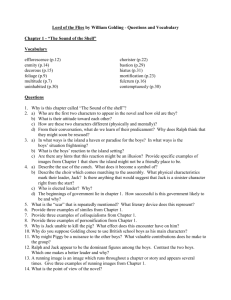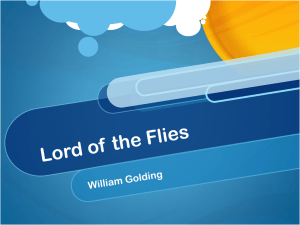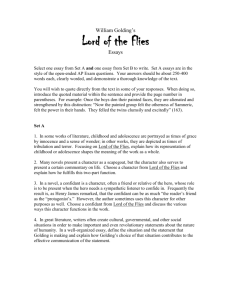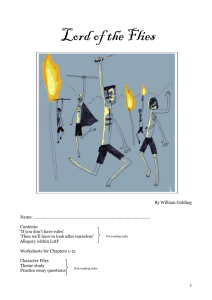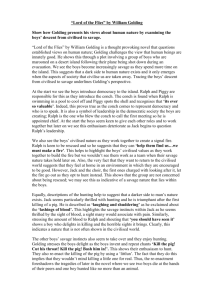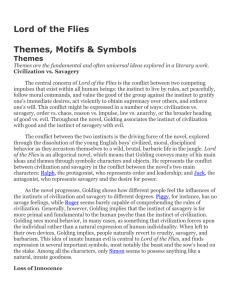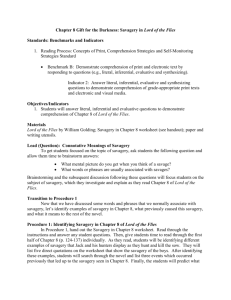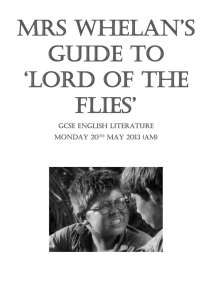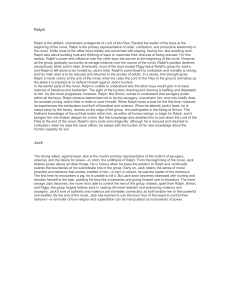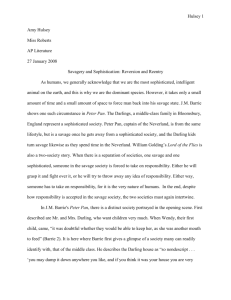The 29th Annual Book Report Competition for Secondary School
advertisement
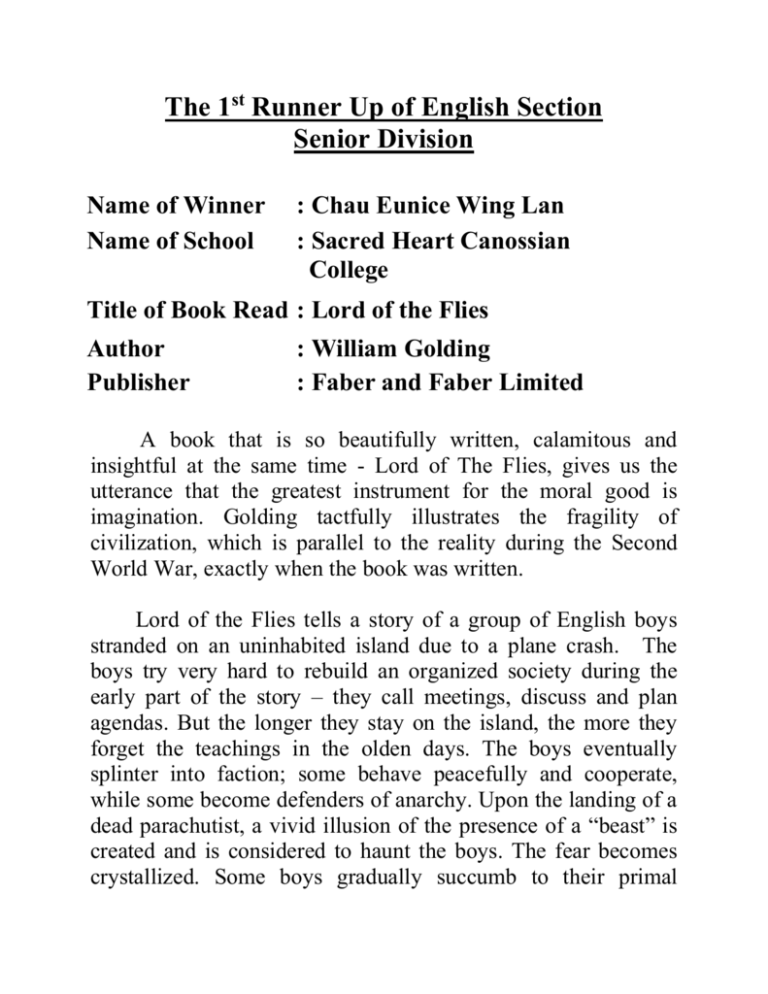
The 1st Runner Up of English Section Senior Division Name of Winner Name of School : Chau Eunice Wing Lan : Sacred Heart Canossian College Title of Book Read : Lord of the Flies Author Publisher : William Golding : Faber and Faber Limited A book that is so beautifully written, calamitous and insightful at the same time - Lord of The Flies, gives us the utterance that the greatest instrument for the moral good is imagination. Golding tactfully illustrates the fragility of civilization, which is parallel to the reality during the Second World War, exactly when the book was written. Lord of the Flies tells a story of a group of English boys stranded on an uninhabited island due to a plane crash. The boys try very hard to rebuild an organized society during the early part of the story – they call meetings, discuss and plan agendas. But the longer they stay on the island, the more they forget the teachings in the olden days. The boys eventually splinter into faction; some behave peacefully and cooperate, while some become defenders of anarchy. Upon the landing of a dead parachutist, a vivid illusion of the presence of a “beast” is created and is considered to haunt the boys. The fear becomes crystallized. Some boys gradually succumb to their primal savage instinct. Although the novel seems to be fictional, the idea of innate human evil is based on what Golding has personally experienced during the Second World War – the barbaric killing and the loss of conscience. In the portrayal of a society, Golding has shown us the struggle between two instincts - civilized and savage behavior. He comes to a conclusion that everyone of us is inherently evil. Civilization is purely imposed on us and can easily be eradicated. Golding avoids the use of poetic and highly descriptive language. Instead he uses symbols and motifs to convey messages, and this is the reason for making this book an intriguing one. This allegorical novel portrays the deterioration of civilization to savagery; democracy to totalitarian; harmony to hostility and innocence to corruption. Each character has significant ramification on the story. Ralph is the core representation of civilization. Jack, on the contrary, represents savagery and degeneration. Roger speaks for brutality and bloodlust to extreme. Piggy is the symbol for science and intellectual thinking. Simon embodies innate natural goodness, which is as primal as Jack’s savagery. I personally interpret this setting as a miniature of the adult world during the Second World War. In a country, we have different groups of people – primary leaders; barbarous agitators; intellectual thinkers; peacemakers and so on. They work together to maintain the operation of a country. Yet, as the ambition and the sovereignty of the agitators expand, they take away the rational ruling of the leader, those intellectual thinkers and peacemakers who oppose to them will ultimately be removed. This is how an overly ambitious country is created and that it adopts starting a war as a means for expansion. And this is simultaneously how the story in Lord of the Flies develops. “Maybe there is a beast… maybe it's only us.” This is a quote from this book, which is said by Simon that I love a lot. As the most insightful boy on the island, he is unafraid of the “beast” because he knows the secret of the island more than any other boys. I especially love this quote because it suggests that humans are actually the origin of evil. Everyone of us is a beast, not physically but inwardly, as time, we let our greed take over us. Human creates fear and jitters for themselves. I believe that Golding has created such a quote because this is what he has inspected during the Second World War. Within four years, such a short period of time, two cataclysmic world wars broke out. Countries formed allies, such as how Jack and Ralph form two different camps to attack each other. The brutal killing involved during the wars, the unlimited ambition and greed of the dictators, is darted on the book Lord of the Flies. The boys on the island initially has the moral sense to remain civilized, yet as some of them among the group let their greed for excitement and immediate victory override them, things then start breaking up and antagonism arise. This is exactly how a spark of a war is lightened. The little boys on the island are like the people involved during the war. They are helpless and scared, but all they can do is to follow and rely on their leaders. People like Simon and Piggy, who are doing for the good of the society, become the sacrifice of a war. As I read through this book, I can see a war, a tragic break down of humanity and a grievous loss of innocence. I sometimes feel coherent to the protagonist of the book – Ralph, who sets about building a society of lawfulness and sanity. Yet, although he has the strong determination to maintain civilization on the island, there are times when he has forgotten about it and succumbs to his savage instinct. I am born in a civilized society. From the moment I opened my eyes, intangible responsibilities are already imposed on me. I receive education (as many other teenagers do as well) on manners and boundless knowledge. Morality is somehow forcefully imposed on me. Sometimes I unknowingly take altruism as a kind of duty, feeling dignified upon an act of courtesy. Our innate, spiritual human goodness, though primal, can be easily shrouded by the imposed teaching of moral responsibility. Undeniably, we are also born with natural human goodness. The 2011 earthquake off the Pacific coast of Tohoku, which is often referred to in Japan as the Great East Japan Earthquake or the 3.11 earthquake, is the most powerful earthquake ever recorded to have hit Japan. The earthquake triggered disastrous tsunami and caused the leakage of radiation from the nuclear plants. 116 countries and 28 international organizations offered assistance. Almost everyone around the globe sympathized with the Japanese and gave their most sincere concern. Video footages released created a fuss; the newest updates were vastly reported; and people donated money and resources to alleviate the burden of the Japanese government and citizens. Although we might not know anyone from Japan, we feel sorry for their suffering and hope to take the edge off their pain. As a student from a catholic school, I also prayed for the dead and the injuries, as well as the Japanese government’s wise allocation of resources and a contemplative aftermath planning. In Lord of the Flies, Simon has the most compassionate heart- picking up fruits high up on the tree for the hungry young boys. We can be Simon sometimes; we climb up the tree and share what we have with the one in need, simply out of benevolence. Humans are such dynamic creatures. We change in different circumferences. Sometimes we can be as savage as Jack: sometimes we change into a sensible leader like Ralph: or sometimes we uphold the value of charity like Simon. A particular description I love in the book is when the antithesis of Ralph, Jack, puts on camouflage for hunting. The detailed narration gives me goose bumps all over my body. The mask is described as a thing on its own, luring Jack into savagery and devouring his self-consciousness. Dazzle paint, used in war, is used as a connection to the reality. This war element reminds readers, I as one of them, that we are often wearing a mask, thinking that we exquisitely stash the guilt when we are committing sins. Humans are self-deceiving when liberated from shame and self-consciousness. For example, some lawbreakers pledge guilty after they behave scandalously. It doesn’t necessarily imply that they have cast off their moral propriety that the society instilled in them, it’s just that moment of greed or desire for fascination – the mask, clouded their sensible judgement. As I read the book, I realize how fragile democracy and peace is. Jack, who rules with autocracy, ultimately takes control of almost all the boys. On the other hand, although Ralph works much harder than Jack and tries to consolidate a basis for a society, he fails to gain support from the majority. Despite not having to worry about my survival, I realize how fortunate I am to live in Hong Kong, in which fundamental human rights are granted to me, such as having laws to protect me against discrimination and inequality. From the power struggle between Ralph and Jack, I understand how difficult it is to build a base of a society. Laws, rules and orders – these crucial elements make the base a solid one. This book reminds me of how precious peace and civilization is. Back to the reality, I see protest and instability in countries like Ukraine. I realize a serene community can only be created with consensus reached between different groups of people in the society. Talking issues through is one crucial step to building a harmonious community. Laws and civilization is the base of the society, while the people and the government is the body of it. Hopefully the affairs in Ukraine can be resolved as soon as possible. You may ask whether or not I agree totally on the stance of Golding. Well, I do believe that humans are born with both evil and goodness. We are also on the inferior side on deciding our fate. But as we journey on our lives, we must not easily give in to our savage instinct. Self-control is what matters. We hope to hold onto civilization and goodness, and minimize the dominion of savagery. Although it may seems contradicting, but somehow it is justifiable to have rule and order forced upon us, otherwise we might all end up having our evil nature unleashed and turn into savages.
